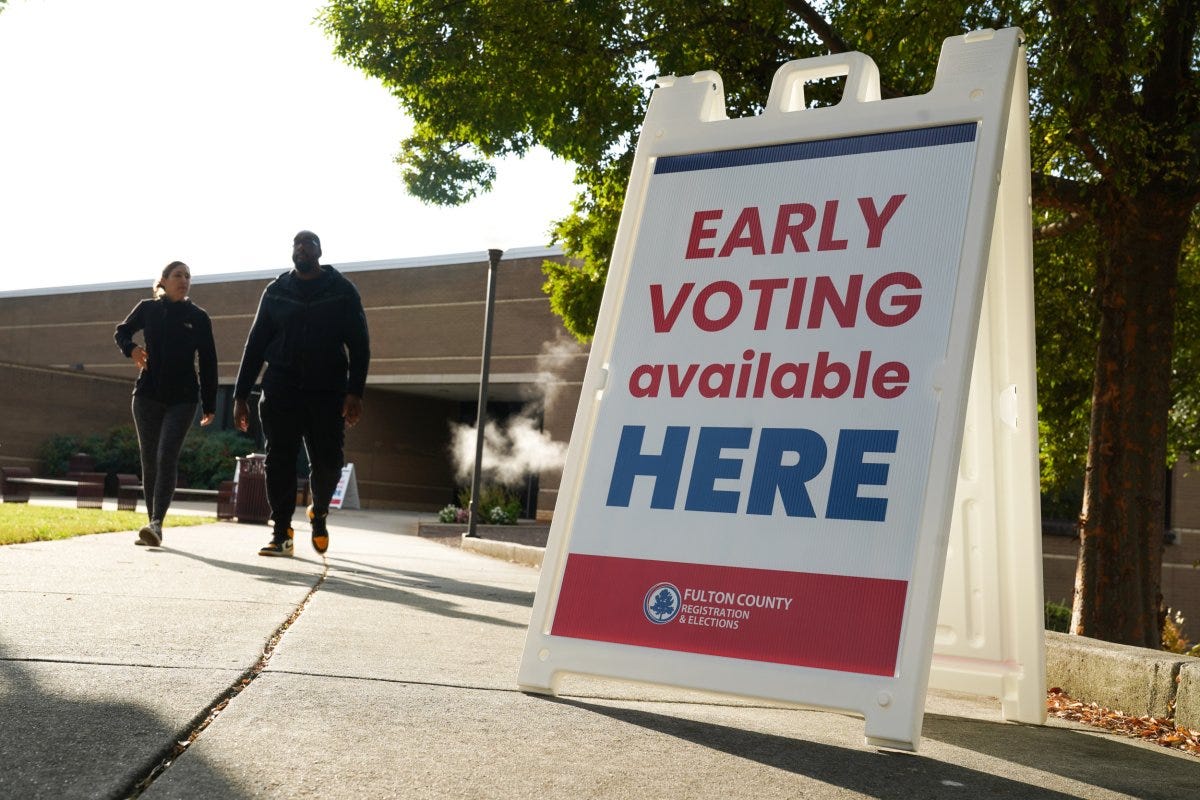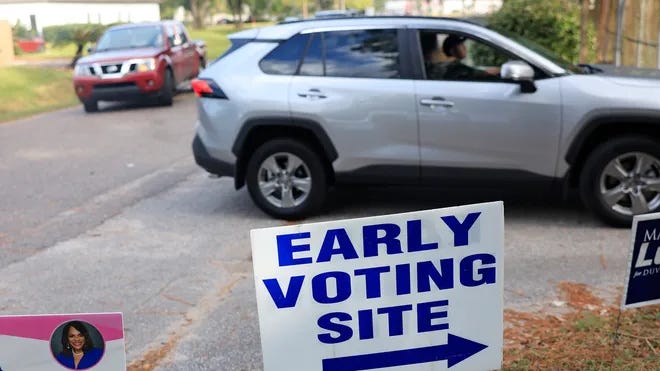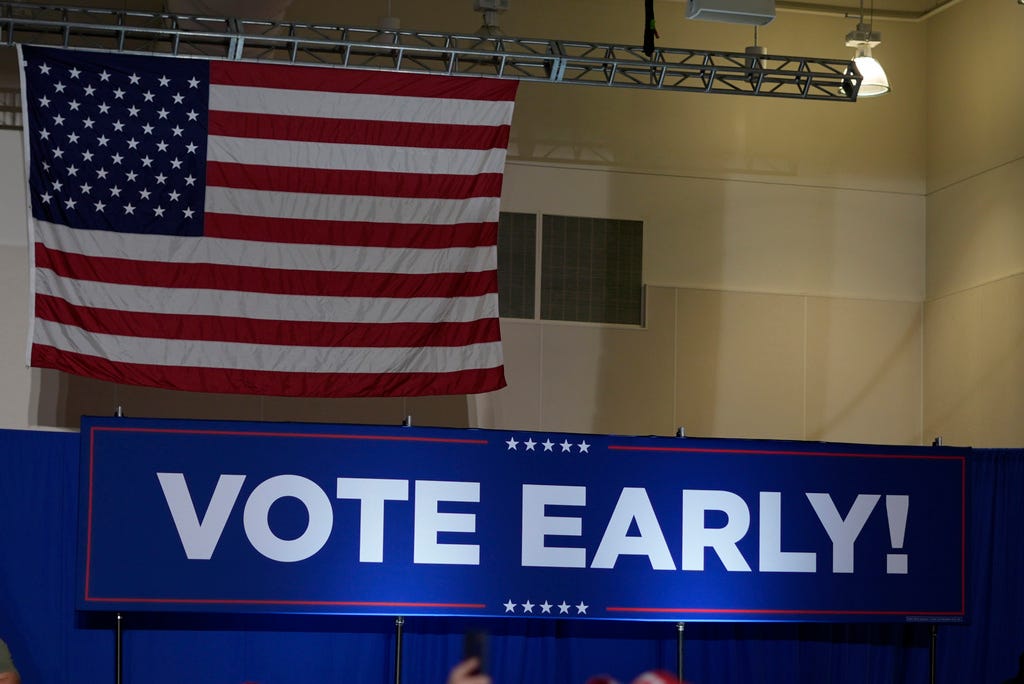What Early Voting Numbers Tell Us
You might be surprised!
Early voting statistics are rolling in, with many states setting records for how many people cast their ballot on the first day of early voting. Last week, North Carolina began early voting on Thursday, and more than 353,000 ballots were cast that day. On Friday, Louisiana set a record with nearly 177,000 cast the first day.
In Georgia, the early voting numbers are off the charts. More than 1.5 million people have already voted in that state, setting records nearly every day since voting opened. On Sunday, Georgia’s Secretary of State Brad Raffensperger said he expects as many as 70% of the votes there to come before Election Day.
Headlines are touting the rise in Republicans participating in early voting: Republicans Eat Into Democrats’ Early Voting Advantage (The Wall Street Journal), More Republicans are voting early, helping break records. Nearly 19 million ballots cast so far (The Associated Press).
On the other side, headlines are saying things like: Early Voting Results Show Some Bright Spots For Democrats (Forbes), Texas sees record early-voting numbers, particularly in Democratic-leaning areas (The Hill).
Trump campaign officials say they’re pleased with the data, while the Harris campaign continues to push people to vote early, especially in swing states like Wisconsin and Pennsylvania.
But I am here to let you in on a little secret: All the speculated data on early voting is just that… speculation. No matter how many news articles you see, no matter how much meaning people try to make from this zip code and that demographic group, we should assume nothing and act accordingly.
Let me explain.
Early voting so far
First, let’s talk about what we’re seeing so far. Nineteen million people have cast a ballot either by mail or in person early voting.
These numbers pale in comparison to the numbers four years ago, during Covid. At this point in 2020, 30 million people had voted early. Some reasons for the disparity: during the pandemic, several states made it easier to vote absentee or early, and since then, some states have passed laws limiting early voting.
In previous elections, high early voting turnout has generally been a good sign for Democrats, especially in 2020. That year, Donald Trump told his supporters not to vote early because he didn’t trust it. He called mail-in ballots “dangerous” and said they would lead to “massive electoral fraud.”
This year’s uptick in Republican turnout is likely due to the amount of work the party has been doing to encourage people to vote early.. Lara Trump, who is co-chair of the Republican National Committee, has recorded robocalls that are being sent out to voters, and even Donald Trump is now telling people to vote early.
What do we know about the actual votes?
Of course, campaigns want to know how many votes have been cast for their candidate. Can they really figure that out?
They can get little glimpses of info by counting how many Democrats and Republicans requested a ballot and how many of those people turned them back in. But they don’t know who those people actually voted for. (Sure, they might be able to make an educated guess in some areas, but in others, the ones that really matter the most in terms of electoral outcomes, it’s really anyone’s game.)
With this information, these campaigns can try to figure out who to target in these final two weeks of the election.
But does it give them the full picture? No. Like I said, assume nothing.
For example, in Georgia, women make up 55% of the early vote so far and Harris is likely to take the female vote (Biden did in 2020), so that’s a good sign for her.
But so far more older voters have voted (age 65+), and Trump won that age group in 2020. So… do they cancel each other out? <Shrugs in electoral politics.> We really don’t have a clue who has more votes at this moment in Georgia.
And in Pennsylvania, about one million early votes have been cast, but that’s compared to seven million in 2020. What does that tell us? Who knows! It could mean there’s still a large number of voters who have yet to make up their mind, voter turnout overall will be lower this year, or people are waiting to vote on Election Day.
It’s all smoke and mirrors
Generally, early voters are the most eager voters, meaning they were always going to vote, whether they had to wait until Election Day or not. Therefore, it is really not indicative of what actual turnout will be, especially among new or undecided voters.
In September, Vote.org, the largest nonpartisan voter registration platform in America, said it had registered more than one million voters during the 2024. This includes a record-breaking number of younger voters (under 35) compared to the 2020 election cycle.
Guess what? Younger voters don’t usually vote early, especially not in the number that older voters do.
Reporting lags in voting are also common, so we might not know for days after someone casts an early ballot. Plus, remember, we don’t know how anyone voted, we just have pieces of information based on party registration.
How are independents voting, for example? We have no actual idea. And less than half of all states report early voting numbers according to party registration status (just 23 states do).
Things could change at the drop of a hat, as shown just a few weeks ago when multiple states were devastated by two back-to-back hurricanes. An outbreak of the flu or covid could occur and stop people from making it to the polls. All those people that campaigns are calling might promise to vote in order to get their phone to stop ringing, but might not actually make it to the polls.
We truly just do not know how many people will vote, and who they will vote for, come Nov. 5.
There are still millions of voters who have yet to vote early, or will wait until Election Day to cast their ballots. So, we won’t officially know for a couple more weeks who our next president will be.
Most importantly: Assume nothing and act accordingly. (That means, don’t look at early voting articles and operate on an assumption that A, B, or C will happen, and thus there’s nothing you can do, or you’re fine to rest on your laurels. Assume your preferred candidate is not up in the early voting prognostication. Act accordingly. Call and text your friends. Show up to vote yourself, whether it’s early in person, mail in/absentee, or on Election Day.)
I am curious: do you have a preferred method of voting? I have a slight preference for Election Day, mostly because it’s exciting. But I’ve voted early and absentee as well, and I take my voting responsibilities very seriously!






It is always a privilege to vote, and I voted early here in Alabama due to travel. BUT as you pointed out assume nothing! I am registered as Republican in a VERY red state but I voted blue. #principleoverparty
Me? I love my mandatory voting system in Australia. The Australian Electoral Commision oversees the federal elections in all states, the NSW Electoral Commission oversees elections in my home state, and both are organisations independent of the political parties. It's so easy, Americans would think it was crazy. I've voted in Australian elections out of my electorate, out of my state, and once from London (I had to go to the Australian Embassy the week before the election). I've voted early because I wasn't going to be available on the day, at the crack of Opening Time at the local polling place, and five minutes before it closed. Every time, it's been simple, easy, and convenient. And if I was lucky, I'd get a "democracy sausage" afterwards!